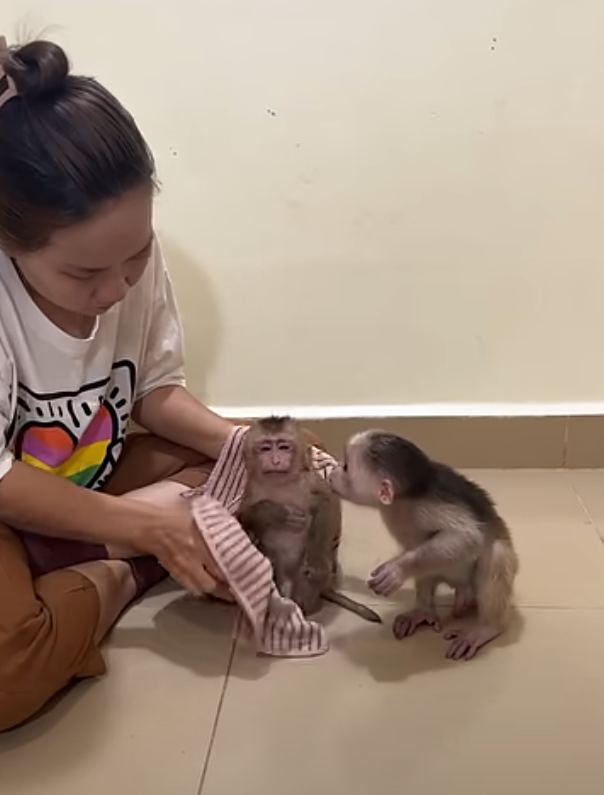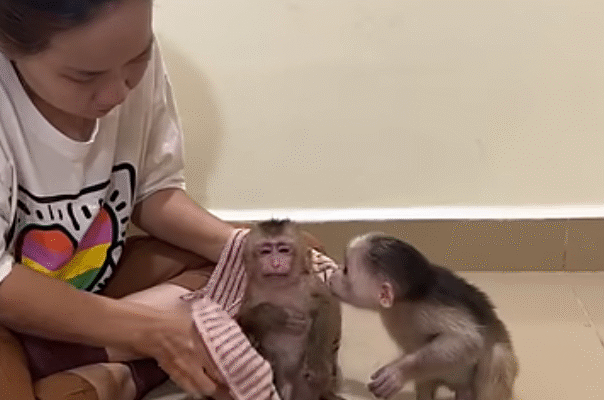There is something deeply moving about watching small, vulnerable creatures receive love, especially when that love comes during their most fragile moments. Among the most endearing sights in the animal world is that of baby monkeys being nurtured—whether by their mothers, their caretakers, or even by other animals. Their innocent eyes, tiny fingers, and playful curiosity make them instantly captivating. But beyond their cuteness lies a story of survival, emotional bonds, and the universal need for tenderness.
This piece explores how baby monkeys receive love and comfort, how it shapes their growth, and why it touches the hearts of those who witness it.
The Fragility of Baby Monkeys
A baby monkey enters the world just like a human child—small, dependent, and fragile. From the moment they are born, their survival depends on the care they receive. In the wild, their mothers cradle them close to their chests, keeping them warm and protected. For weeks, these infants cling tightly to their mother’s fur, sleeping, feeding, and finding safety against her heartbeat. This constant contact reassures them, helping them develop a sense of security.
In sanctuaries or rescue centers, orphaned or injured baby monkeys often need even more care. Without their mothers, they rely on human caregivers who step in to provide food, warmth, and affection. These babies are bottle-fed with milk, wrapped in soft blankets, and gently rocked to sleep. Caregivers understand that, much like human infants, baby monkeys thrive on touch and reassurance.

A Mother’s Tenderness
The bond between a mother monkey and her baby is one of the strongest in the animal kingdom. From grooming to carrying, mothers provide both physical and emotional support. When a baby cries, the mother instantly responds—picking the little one up, pressing it close, or softly grooming its fur to calm it down.
This tenderness goes beyond survival. Grooming, for instance, is not only about hygiene but also about building trust and love. A mother carefully running her fingers through her baby’s fur is both comforting and bonding. The little monkey relaxes, sometimes even closing its eyes in contentment.
In some species, mothers carry their young for months, giving them constant warmth and presence. The baby, in turn, feels secure enough to explore the world slowly, always returning to the comfort of its mother’s arms. This cycle of exploration and reassurance lays the foundation for emotional development.
Orphaned Babies and Human Care
Not all baby monkeys are fortunate enough to stay with their mothers. Some are orphaned due to hunting, deforestation, or accidents. When this happens, sanctuaries and rescue organizations often take them in. Here, the role of human tenderness becomes critical.
Caregivers know that these little ones are not just hungry for milk but also for affection. A baby monkey left without love can become anxious, withdrawn, or even ill. That’s why caretakers mimic maternal care as closely as possible: holding the baby close to their chest, giving it soft toys to cling to, or wrapping it in a blanket that smells familiar.
It is heartwarming to see how quickly these babies respond. At first shy or fearful, they gradually begin to trust. They reach out tiny hands to touch their caretakers’ faces, nuzzle into their arms, and relax enough to play. The transformation is a testament to the power of tender care.
Comfort Through Play
One of the most joyful expressions of love among baby monkeys is play. Playing is not just about fun—it is a form of comfort and connection. Young monkeys chase each other, climb, tumble, and wrestle, all while learning about boundaries and trust.
In sanctuaries, even with human caregivers, play is encouraged. Caregivers provide climbing ropes, swings, and soft toys. Baby monkeys, with their boundless energy, use these to release stress and build confidence. Their laughter-like squeaks and joyful hops show that they feel safe enough to let go of fear.
Play also strengthens bonds among the babies themselves. Orphaned monkeys often form little groups, almost like families, where they groom each other, huddle together for naps, and comfort one another when scared. This sense of belonging becomes their version of love and comfort.
Emotional Intelligence of Baby Monkeys
Monkeys are highly intelligent, and their emotional lives are surprisingly similar to ours. Baby monkeys can feel sadness, loneliness, and fear—but also joy, affection, and relief. Tender care allows these emotions to find healthy expression.
For example, when a scared baby monkey is hugged or stroked, its cries often quiet down instantly. Scientists studying primates have noted how oxytocin—the same hormone linked to love and bonding in humans—rises in monkeys when they are comforted. This biological response shows that the tender touch they receive is not just a momentary relief but a building block for emotional well-being.
Stories of Love and Rescue
Many touching stories come from rescue centers around the world. In one case, a baby monkey found injured and alone after a storm was brought to a sanctuary. At first, the little one clung desperately to a stuffed toy, crying when anyone approached. But with gentle patience—soft feeding, slow grooming, and constant presence—the caregivers slowly gained its trust. Within weeks, the baby no longer clung to the toy but instead nestled into the arms of its caretakers, finally feeling secure again.
In another sanctuary, groups of orphaned baby monkeys are paired with surrogate mothers—sometimes older female monkeys, sometimes even gentle dogs who naturally provide warmth and companionship. These unusual bonds show how universal the need for comfort is.
The Human Connection
Why does watching baby monkeys receive love and comfort touch us so deeply? Perhaps because we recognize ourselves in them. Their tiny hands reaching out, their eyes searching for reassurance, their relief when held—all mirror the experiences of human infants.
Tenderness is a universal language, bridging the gap between species. Whether it’s a monkey mother hugging her baby or a human caregiver rocking an orphaned infant to sleep, the act of giving comfort resonates across boundaries. It reminds us that love is not limited by language, culture, or species—it is a shared instinct for nurturing life.
Lessons From Baby Monkeys
Observing baby monkeys teaches us important lessons:
- Love Heals: With tenderness, even the most frightened and fragile beings can recover and thrive.
- Touch Matters: A gentle hug or caress can bring more comfort than words.
- Play is Essential: Joy and fun are as vital to well-being as food and shelter.
- We All Crave Belonging: Just like monkeys, humans need family, friends, and community.
These lessons extend beyond animal care—they remind us to be gentler and more compassionate with one another.
Conclusion
“Tender Care: Baby Monkeys Getting Love and Comfort” is more than a sweet image—it is a reflection of life’s deepest truth: that love sustains us. Whether in the wild, in sanctuaries, or in the arms of human caregivers, baby monkeys thrive on tenderness. Their tiny hands, their trust, and their joy are living proof that kindness has the power to heal and transform.
Watching these babies find comfort inspires us to nurture with more patience and gentleness, not just to animals but also to each other. For in giving tender care, we share in the most universal and timeless act of all—the act of love.



